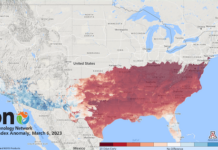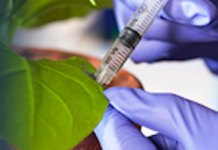
Scientists with the U.S. Agricultural Research Service (ARS) have shown that seed meal from plants in the mustard family can kill mosquito larvae, which start their lives in stagnant water. The findings, recently published in the journal Scientific Reports, open the door to a biobased approach to controlling the biting insect pests.
Lina Flor-Weiler, an entomologist with the ARS, and her ARS co-authors are the first to report the potential of mustard seed meal to kill mosquito larvae, which feed on bits of organic matter and microorganisms in shallow bodies of water.
In studies begun in 2022, the researchers examined the larval-killing potential of isothiocyanates, a group of plant defense chemicals that are released when mustard seed meals are soaked in water. Prior research by other groups has shown that isothiocyanates can kill insect pests and soilborne parasites and pathogens, including root-damaging nematodes and disease-causing fungi.
However, there was little in the existing scientific literature about the potency of these compounds against insect disease vectors like mosquitoes, noted Flor-Weiler. To learn more, the researchers prepared seed meal from four types of mustard family plants—brown mustard, pennycress, garden cress and white mustard—and added varying concentrations to small beakers of water containing larvae of Aedes aegypti mosquitoes. The researchers also exposed larvae in separate beakers to one of three types of isothiocyanates extracted from the meals. In all trials, they monitored the effects on the larvae at 24 and 72 hours and documented the highest isothiocyanate concentrations needed to kill at least 50% of the larvae.
Of the four seed meal types, garden cress proved the most lethal, killing more than 95% of mosquito larvae after only 24 hours and 100% in less than 48 hours. All seed meals were toxic to the larvae, except for a pennycress treatment that had been heated. This was intentionally done to deactivate myrosinase enzymes (which are necessary for the production of isothiocyanate) and confirm that their absence in the seed meal allowed the larvae to survive.
More studies are planned, the researchers said, but the early evidence thus far points to a promising bio-based alternative to synthetic insecticides that can be derived from an inexpensive agricultural byproduct of processing mustard seed into oil and spices. This research push also addresses another concern: preventing the onset of mosquito resistance to synthetic insecticide ingredients, noted Flor-Weiler.
Click here for the full ARS press release.
For more on pest control, see:
The Spongy Moth…It’s Back And Spreading. Find Out Where.
Top 20 Regions For Spotted Lanternfly
Got Grubs? Act Now For Best Results











![[VIDEO] Dickies®: Discover Workwear That’s Anything But Uniform](https://turfmagazine.com/wp-content/uploads/2023/06/1647663814-4b1a2a7742790a9b1e97a3b963477850192e1d6a9dfba9b07214a77bae25d6e3-d-218x150.jpg)






























![[VIDEO] Dickies®: Discover Workwear That’s Anything But Uniform](https://turfmagazine.com/wp-content/uploads/2023/06/1647663814-4b1a2a7742790a9b1e97a3b963477850192e1d6a9dfba9b07214a77bae25d6e3-d-324x160.jpg)